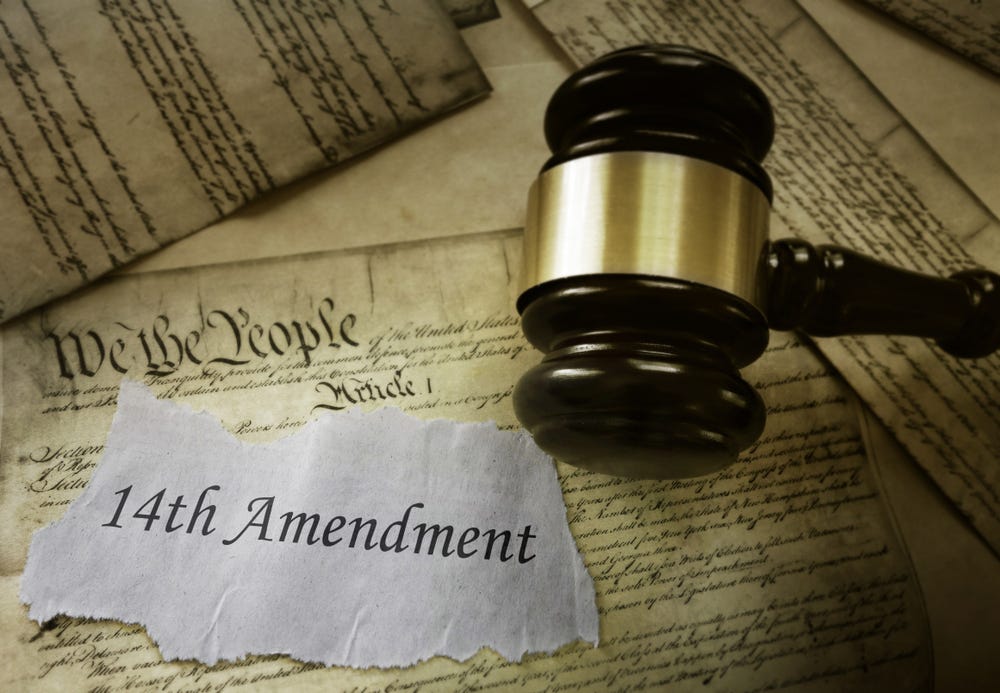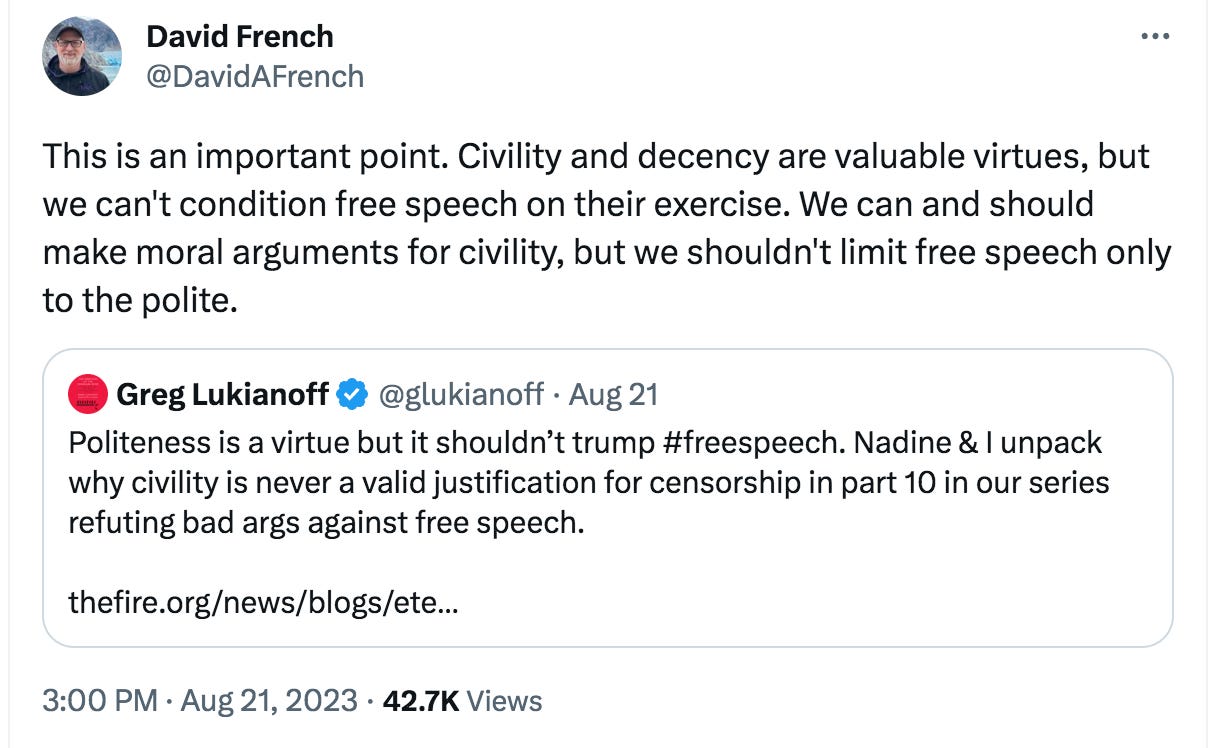E-Pluribus | August 22, 2023
Progressives versus progressives; Australia faces a thorny question regarding its indigenous peoples; and what about the Fourteenth Amendment, anyway?
A round-up of the latest and best writing and musings on the rise of illiberalism in the public discourse:
Matthew Yglesias: The two kinds of progressives
Matthew Yglesias tends to have progressive/liberal views, but can nonetheless drive other liberals up the wall with his contrarian takes. At his Slow Boring site, Yglesias contrasts the progressive “moralists vs. pragmatists,” the former of which he asserts are breaking new ground with their no-compromise positions.
[In] 2023, a survey of the political landscape that “focuses exclusively on the ‘economic’ dimension of ideological disagreement” misses some crucial points.
[V]oting behavior is increasingly driven by alignment on social and cultural questions. I think that’s true not only of the mass public but of elite actors, writer types, and intellectuals, too. For a good sense of what I think is actually the most important divide in the broad center-left camp, it’s instructive to listen to the April 23 episode of Georgetown University historian Thomas Zimmer’s podcast with Johns Hopkins political scientist Liliana Mason as a guest. The thesis of the episode is that it’s wrong to frame “polarization” as a problem because the real problem is that Republicans are bad. On climate change, for example, Zimmer says the parties clearly have moved further apart. But, according to him, “Democrats aren’t moving toward an extreme position,” they’re moving toward an expert consensus, while Republicans are “driving into fantasyland.”
Then Mason follows up by talking about the impossibility of compromise on what she sees as fundamental questions of rights.
“You can compromise on what level of taxation we should have,” she says. “You can compromise on things like, you know, how much aid we should give to foreign nations.” By contrast, “the problem is when we’re talking about whether an entire group of human beings in the country who are American citizens should be eradicated. There is no compromise position there. We can’t compromise on whether Black Americans should be treated equally as white Americans.”
And to be clear, Mason isn’t talking about a hypothetical situation where an extremist party gains critical mass and it’s impossible to compromise with them.
That’s her characterization of the present-day Republican Party’s stance on transgender rights and racial equality. Zimmer has occasionally tweeted unkind things about me in ways that I’ve found somewhat puzzling, and this episode helped me understand where he’s coming from. Because this idea they are articulating — that there is a set of identity-linked issues that are beyond the scope of normal political give and take — strikes me as truly the most fundamental divide in progressive politics today. A divide so important that it transcends disagreements about everything else, precisely because the claim being made on the Zimmer/Mason side of the line is that the imperative for a principled stand on these topics trumps all other considerations.
Read it all.
Andrew Gleeson: A Voice from the Heart
Although admittedly a rather abstruse issue, Andrew Gleeson’s essay at Quillette regarding a situation involving the indigenous population in Australia is nonetheless worthy of attention. The United States’ history with its own indigenous peoples has been rocky, to say the least, and there may be valuable lessons and cautionary tales to be learned when trying to right past wrongs that can be learned from what’s going on down under.
In May 2017, representatives of Australia’s indigenous peoples—Aboriginals and Torres Strait Islanders—met at Uluru, the great monolith at the physical centre of the continent which serves as the symbolic heart of the country. After four days of deliberation, they released an appeal to the Australian people called the Uluru Statement from the Heart.
[ . . . ]
The Statement talks in highly general—even vague—terms of a “First Nations Voice enshrined in the Constitution” and a Commission to “supervise a process of agreement-making between governments and First Nations and truth-telling about our history.” The reference to a “First Nations Voice” is well understood in Australia to mean a publicly funded body of indigenous representatives, elected by indigenous communities, established to advise the federal parliament and government on legislative matters and executive decisions that affect indigenous peoples. The advocates of the proposal stress that such a body would be advisory only; both parliament and government are at liberty to modify or reject any advice given, though critics question how great this liberty will be in practice.
[ . . . ]
The Yes case posits that the establishment of a constitutionally embedded Voice is, in the opening words of the referendum proposal, a “recognition of Aboriginal and Torres Strait Islander peoples as the First Peoples of Australia.” Such an acknowledgment, it is implied, would itself be an act of justice in repair for historic wrongs; an act with both tangible and symbolic dimensions. The No side argues that a body like the Voice is racially invidious, according special privileges to one race over others—unjust in its own right and a threat to national harmony in its consequences.
Any individual or group is, of course, already free to lobby parliament and government on any matter it likes; that is the currency of democratic politics. Moreover, it is right and proper, indeed often obligatory, for parliament and government to consult those whom a given law, policy, or decision will especially affect. And it is far from unprecedented for government to appoint individuals or establish publicly funded bodies to advise it. Indeed, whole areas of government could scarcely function without doing so. Presumably the No case does not object to these commonplaces. But then, if farmers constitute a group with a special stake in agricultural policy, unions a group with a special interest in labour policy, hoteliers and restauranteurs a group with a special interest in tourism and liquor policy, why cannot a race or ethnicity in principle constitute a group relative to their defining interests?
The difference, the No case argues, is that we do not pick out one such interest group—and especially not one united by race or ethnicity—and establish for it in the constitution a right and power to advise parliament and government, a privilege accorded to no one else. Yet at the same time, many (not all) on the No side—including former prime ministers John Howard and Tony Abbott—support a purely symbolic constitutional recognition of Aboriginals and Torres Strait Islanders as the original inhabitants of Australia. But in granting that constitutional recognition, they effectively concede that Aborigines are not just another interest or lobby group like farmers, unions or hoteliers and so on, groups of individuals who happen to share an interest (in better wages, conditions etc.). Rather, indigenous people have common interests qua group and not just any group but a people, a nation. They therefore have interests in being recognised and dealt with as a nation, and one badly shellshocked by an historic injustice. But if that is so then there is nothing inherently antagonistic to the ideal of equality under the law in the idea of their having a form of political participation not granted to other groups.
Read the whole thing.
J. Michael Luttig and Laurence H. Tribe: The Constitution Prohibits Trump From Ever Being President Again
Although Trump supporters might view this as the legal equivalent of “try this one weird trick” of clickbait advertising infamy, two distinguished legal scholars have taken to the pages of The Atlantic to argue that Donald Trump is already ineligible to run for president again regardless of the outcome of all the legal proceedings in which he is currently embroiled. Former federal judge J. Michael Luttig and Harvard’s Laurence Tribe write that there is plenty of incontrovertible evidence in the public record that the Fourteenth Amendment trumps all other considerations on the eligibility question.
The historically unprecedented federal and state indictments of former President Donald Trump have prompted many to ask whether his conviction pursuant to any or all of these indictments would be either necessary or sufficient to deny him the office of the presidency in 2024.
Having thought long and deeply about the text, history, and purpose of the Fourteenth Amendment’s disqualification clause for much of our professional careers, both of us concluded some years ago that, in fact, a conviction would be beside the point. The disqualification clause operates independently of any such criminal proceedings and, indeed, also independently of impeachment proceedings and of congressional legislation. The clause was designed to operate directly and immediately upon those who betray their oaths to the Constitution, whether by taking up arms to overturn our government or by waging war on our government by attempting to overturn a presidential election through a bloodless coup.
The former president’s efforts to overturn the 2020 presidential election, and the resulting attack on the U.S. Capitol, place him squarely within the ambit of the disqualification clause, and he is therefore ineligible to serve as president ever again. The most pressing constitutional question facing our country at this moment, then, is whether we will abide by this clear command of the Fourteenth Amendment’s disqualification clause.
[ . . . ]
Among the profound conclusions that follow are that all officials who ever swore to support the Constitution—as every officer, state or federal, in every branch of government, must—and who thereafter either “engaged in insurrection or rebellion” against the Constitution or gave “aid and comfort to the enemies” of that Constitution (and not just of the United States as a sovereign nation) are automatically disqualified from holding future office and must therefore be barred from election to any office.
Read it all here.
Around Twitter
You can say a lot of things in a library, but in Davis, California, calling a male a male, even a male who isn’t present, isn’t one of them. Via Conor Friedersdorf:
“If you can’t say something nice, don’t say anything at all” is good advice on interpersonal relationships from Thumper’s father (see Bambi), but it doesn’t always work when engaging in public discourse, and it’s certainly not Constitutionally enforceable. Via Greg Lukianoff and David French.
And finally, California community colleges have been hoist with their own glossary. Via the Foundation for Individual Rights & Expression:









